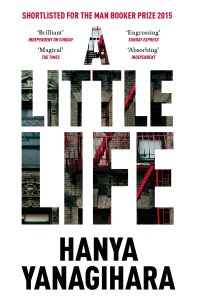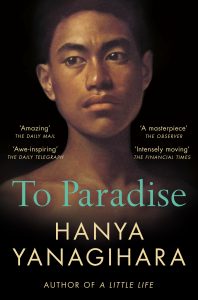Hanya Yanagihara: To Make It All Look Easy
Written for UEA Live by Michael Baker
Dashing awkwardly through the rain towards Lecture Theatre 1, my expectations bounced around my head just as the thousands of water droplets hounded my ankles. I have always found it troublesome to anticipate what the guests of UEA Live might discuss in their evenings with us; it is difficult to auger brilliance of that scale. Hanya Yanagihara, of course, was no exception to this trend. In fact, given the depth and breadth of her work, any attempt to presume what she might talk about was only proven more difficult. Even with discussion narrowed down to focus on her new novel, To Paradise, I was all too aware of all of the potential pathways that the conversation might take, the myriad routes staring down upon me like realm-spanning Yggdrasil as I took my seat.
Things started slightly late, and I must admit to having been a little impatient. It’s not all that often that an aspiring young writer like myself gets to listen to an international best-seller speak about their work in person. Thankfully, I can wholeheartedly say that the evening was worth the wait.
Hanya took the stage alongside interviewer Georgina Godwin (voice of The British Council’s Arts Podcast and presenter of Monocle’s Meet the Writers), and the eager audience seemed to relax as they came into their seats and settled in. At first, I was struck by the casual, friendly tone of the conversation that flowed on stage. Hanya lamented the horrific journey she had into Norwich. She damned the rain and the dark. And she smiled softly as she was introduced as the author of a masterpiece. Eminently personable, she seemed pleasantly bemused by Georgina’s offer of a glass of wine, and noted her range of experiences with alcohol availability at public events. She recalled a book signing she’d held in Amsterdam where wine was offered not only to her, but to all those waiting in the queue for a signature. When she had asked after that same wine in a Waterstones’ book signing, however, the horror on her host’s faces was apparently plain to see. I mention this only as an example of but one of the many times that Hanya pulled a resounding laugh out of the audience. Throughout the event, her easy humour and relaxed attitude impressed on me a great wit and greater humility, a quick mind readily turned to the entertainment of a crowd.
 This humility was characteristic of all of her answers throughout the interview. She reflected with great modesty that her works had been translated across many languages and even formats, with her novel A Little Life currently running a stage adaptation. On her batman-esque double life as both Editor-in-Chief of New York Times style magazine, T, and bestselling author, Hanya only said that she thought “most people can do two things”. As if this wasn’t enough proof of her formidable intelligence, it was thrilling to see the way that Hanya seamlessly and almost carelessly weaved insightful and poignant quips into her everyday familial stories. When asked about the inspiration for To Paradise, she was very open about her upbringing and the time she spent in Hawaii, one of the “lost kingdoms” that she saw in the USA today. Not only was that idea of lost kingdoms a beautiful, terrible image, but it was also an idea I’d never considered before. With only a few words, Hanya Yanagihara made me reimagine the fundamental truth of the most powerful country in the world.
This humility was characteristic of all of her answers throughout the interview. She reflected with great modesty that her works had been translated across many languages and even formats, with her novel A Little Life currently running a stage adaptation. On her batman-esque double life as both Editor-in-Chief of New York Times style magazine, T, and bestselling author, Hanya only said that she thought “most people can do two things”. As if this wasn’t enough proof of her formidable intelligence, it was thrilling to see the way that Hanya seamlessly and almost carelessly weaved insightful and poignant quips into her everyday familial stories. When asked about the inspiration for To Paradise, she was very open about her upbringing and the time she spent in Hawaii, one of the “lost kingdoms” that she saw in the USA today. Not only was that idea of lost kingdoms a beautiful, terrible image, but it was also an idea I’d never considered before. With only a few words, Hanya Yanagihara made me reimagine the fundamental truth of the most powerful country in the world.
She talked about her parents and their tortoise, and what could very easily have been a run-of-the-mill family anecdote became a profound existential query. Neither Hanya nor her brother have children, so Hanya wondered whether the tortoise had become a kind of substitute grandchild, a child across the generations needing care and guidance, a living inheritance in her family. She pondered whether the aged reptile was a way for her parents to off-put their fear of death, worrying on about the life that would go on without them. But careful never to let the conversation turn morose, Hanya kindly opined that the tortoise might mean nothing of that kind to her parents, who might just be “too stupid” to see it as such. Queue more well-deserved laughter from the audience.
It was clear to see that family was incredibly important to Hanya, though she has no children herself, and expressed no interest in having them, she was passionate about the idea that family need not be connected by blood, and that a family may take many equally valid shapes. Asked about the role of parents in her novels, she said that “so much of a woman’s life and a woman writer’s life depends on the era in which they were born and how generous their father was… If he saw you as someone with a mind.” Thankfully, it seems that Hanya’s father was a generous and supporting figure in her life, pushing her when she was younger to pursue her talents for visual art. She even remarked that he arranged for her to study a cadaver as an artistic muse, teaching her the aspect and form of the human body, yes, but also that death was not something to be feared.

This idea of defiance in the face of mortality seems directly interwoven into the soul of To Paradise, where a dystopian, tyrannical state denies its population freedom for the sake of security. Though the image seems quite on-the-nose for us living in a post Covid world, Hanya rebuked the idea that Covid was a big influence on the plot of the novel. To Paradise may be a world of plague and pandemic, but Hanya’s vision of the future is far darker than anything we might recognise today; it forces us to ask how much we’re willing to sacrifice to keep on going in this world. It is the fear of death, Hanya argues, that we find reason to oppress the living. She asks us, “at what point do you let death happen because the alternative is making life unliveable?”
I left the event pondering this question. I would continue to do so until the early hours of the morning. I also thought about buying a tortoise. Somehow, Hanya Yanagihara simultaneously offered a time for reflection on the biggest and smallest questions in life. And she made it look easy.
Signed copies of To Paradise can be purchased from Waterstones here.
Michael Baker (he/him) is an aspiring novelist and writer with ADHD. He is a first-year undergraduate student in English Literature with Creative Writing at UEA. It is his hope to write books that can serve to educate people about the nature of ADHD with hopes of beginning to erode harmful public perceptions brought about by decades of misinformation and misrepresentation in popular media.

